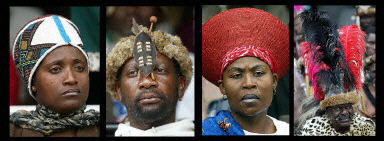Africa

Can a New Union Bring Africa Together?
Birth of the African Union
It was, by all accounts, a great party. As more than 25,000 people watched in Durban’s ABSA rugby stadium, a fleet of parachutists descended from the sky, and a colorful parade marched by that included everything from bare-breasted Zulu maidens to two national soccer teams. The occasion was the launch of the African Union (AU) on July 9, an event that marshaled a record attendance of 43 heads of state from across the continent.
 |
| Africans in traditional dress from across the continent celebrate the birth of the African Union in Durban, July 9, 2002 (Photo: AFP). |
The AU has pledged to do better. Unlike the OAU, which respected the sovereign powers of its member countries, the AU has been planned as a pan-Africanist organization. Modeled on the European Union, it will have its own Parliament, central bank, and court of justice. Perhaps most significantly, its Peace and Security Council has a mandate to intervene in regional conflicts involving war crimes, genocide, and crimes against humanity, giving it powers that far exceed those of the OAU.
Amid the razzmatazz of its opening ceremonies, the advent of the AU was greeted with both optimism and skepticism in the African press. For Naseem Mahatey, writing in Johannesburg's black community-oriented City Press (June 30), the AU was “the new continental vehicle purpose-designed to take on the challenges of the 21st century and to realize Africa’s renaissance.”
But an editorial in Gabarone's independent weekly Mmegi (July 5-11) called it “a giant paper tiger” and worried that “the continent’s diversity of religions, political structures, economic advancement, [and] caliber of leadership can only show the AU to be pie in the sky. Though the idea of the AU is noble, the situation on the ground points to the fact that its birth might be premature. Africa needs to put its house in order first and totally overhaul its act for the AU baby to thrive into mature adulthood.”
Banjul’s independent biweekly The Independent (July 13) warned the AU to guard against colonialism. “While the whole continent basks in the euphoria, amidst the pomp and pageantry of the birth of the AU, we nevertheless call for cautious optimism, dogged determination, and stoic reserve to resist every attempt by organized global vultures in dove’s clothing to thwart the lofty project by sheer subtlety,” The Independent said in an editorial.
The presence at the launch of such leaders as Zimbabwe’s Robert Mugabe and Libya’s Muammar Qaddafi led many commentators to wonder whether the AU would live up to its promise of imposing standards of good governance on its member countries. “How can rulers who are themselves clearly the problem be part of the solution?” asked Shyaka Kanuma in Johannesburg's liberal Mail & Guardian (July 12). “These men are not troubled by niceties such as respect for human rights, concern for their populations’ material welfare, or consensual decision-making.”
In the week preceding the launch, such questions dogged the nascent organization as the memberships of Swaziland and Madagascar were challenged. After a fierce debate, Madagascar—whose current leader, Marc Ravalomanana, took power after a disputed election in December—was barred from the union, much to the disgust of Swazi opposition groups, who wanted their own country banned.
“The criteria used to deal with different countries has been riddled with inconsistency,” wrote Bongani Masuku, secretary-general of the Swaziland Solidarity Network, a network of Swazi opposition groups, in a letter to the AU quoted by Durban's liberal Daily News (July 5). “The barring of Madagascar from the AU while accepting the Swazi despot, [King] Mswati [III], indicates the deep-seated nature of this problem.”
Zimbabwe’s pro-government Herald took a different view, saying that the AU’s decision to bar Madagascar demonstrated the new organization’s independence from Western influence: “The continent’s principled position on Madagascar has…exposed the double standards of the United States, Britain, the European Union, International Monetary Fund and World Bank on issues to do with good governance, democracy, and constitutionality,” wrote the Herald in an editorial comment (July 14).
Another controversial element was the New Partnership for Africa’s Development (NEPAD), the divisive proposal that has been adopted as the AU’s economic policy. NEPAD, which is the brainchild of the presidents of South Africa, Nigeria, Senegal, and Algeria, proposes that member countries will pledge good governance in return for foreign aid. It has been widely criticized for being a presidential initiative that puts Africa’s needs at the whim of First World countries.
“Put politely, NEPAD...is nothing other than an earnest appeal to the West’s conscience for help,” wrote Kanuma in the Mail & Guardian (July 12). But an editorial Kampala's government-owned New Vision (July 11) put a positive spin on the fact that a recently concluded G-8 summit had failed to commit a package of aid to NEPAD: “The fact that the expected check from the G-8 bounced...helped to clear misconceptions and renewed consensus that whether it is NEPAD or AU, we have to do things ourselves...not because somebody in Europe or America likes them or not.”
Despite all the criticisms, the launch of the AU did inspire optimism in some quarters. London's bimonthly newsmagazine New African praised the fact that commitment to human rights had been written into the AU treaty: “The old days, when those rights could be overlooked because of one-sided concern for government authority, have definitely gone,” it wrote (July/August).
Others expressed hope that the AU—under the leadership of South Africa’s President Thabo Mbeki—would have the political muscle to close the gap between Africa and the developed world. “Enlightened African leaders are trying to harness the continent’s bargaining power in the face of globalization,” read an editorial in Nairobi's independent East African Standard (July 2). “We hope Africa [has] learned from the failures of the OAU to make [the] AU work.”







